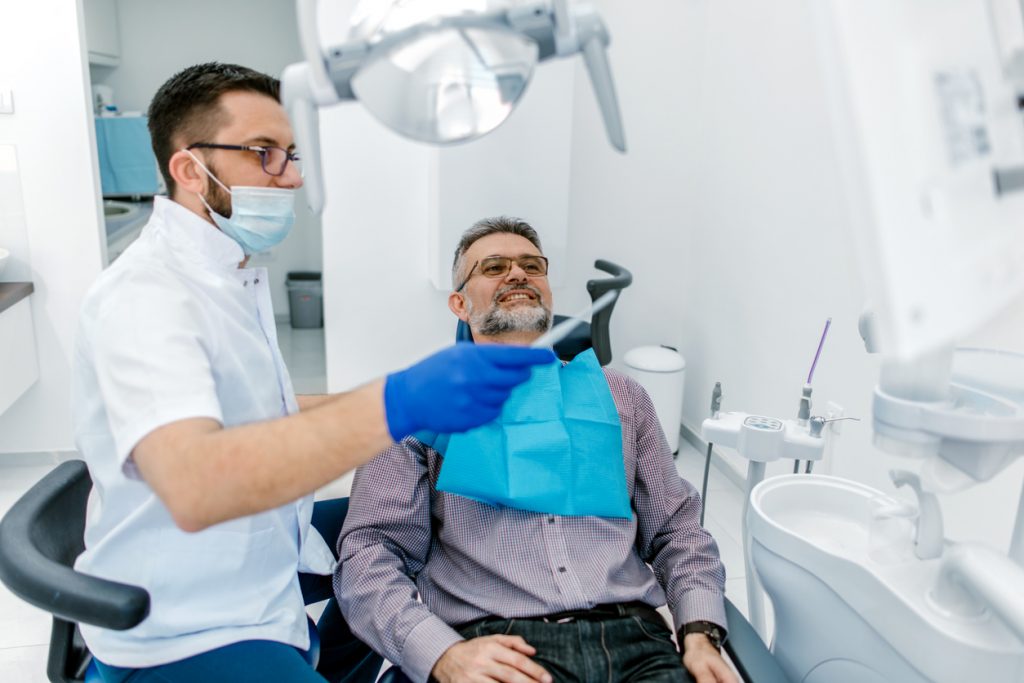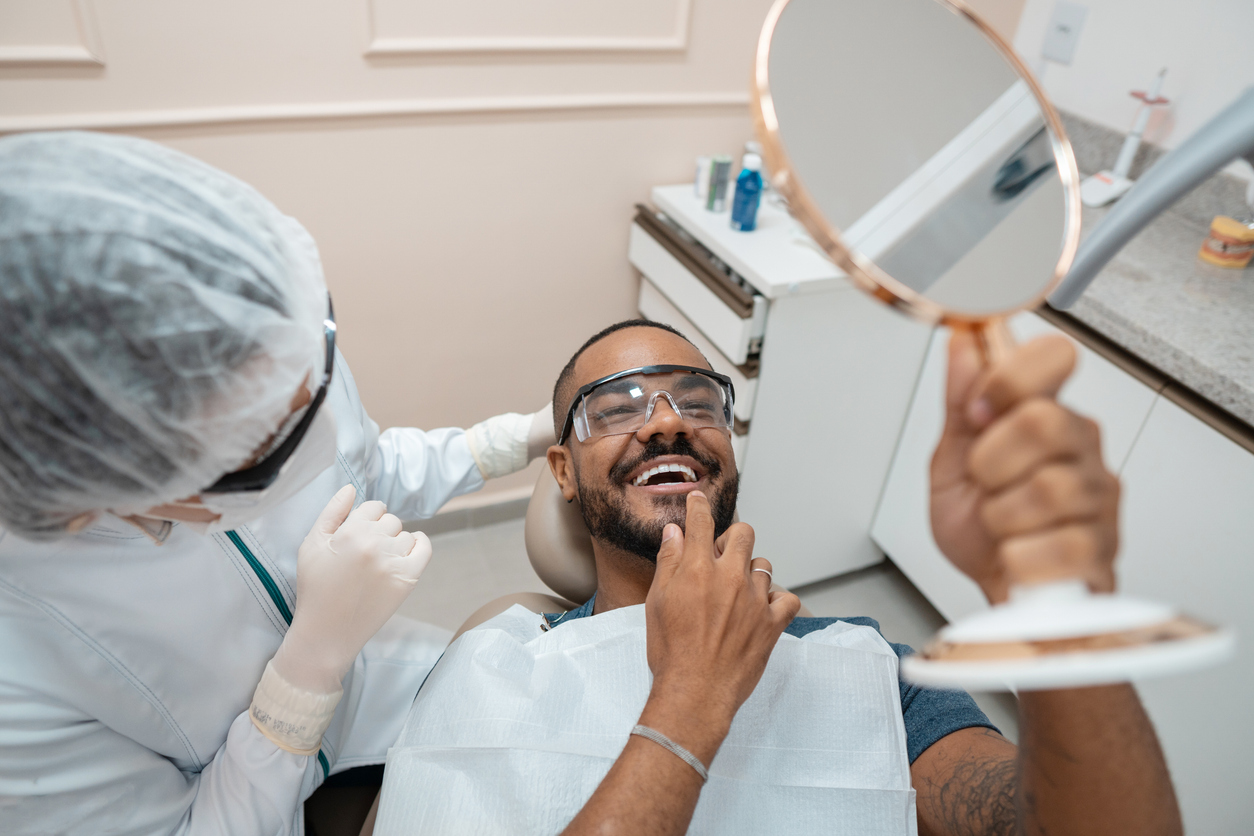Dental implants are a fantastic way to restore broken, damaged, or missing teeth into a beautiful, and aesthetically pleasing smile. Just as with any surgical procedure, however, the post-surgery healing process will vary from patient to patient. You’ve worked with your dental implant surgeon to assess and plan your treatment approach. Likewise, remember to keep the lines of communication open afterward, too! Whether you’re educating yourself before your surgery date or simply staying cautious and informed as you heal, here are a few important things to be aware of.
Professional Periodontal Team and Good Hygiene Post Surgery
In general, it’s perfectly natural to have concerns about the sensations and observations as you adjust to your new smile. That’s why it’s important to have a professional, trustworthy team on your side to answer questions and offer guidance. (The good news is, if you’re here reading this, you’ve already found an excellent Phoenix dental implant surgeon to meet your needs!)
Above all, excellent hygiene is a must after your procedure, as is following the aftercare instructions of your surgical team. Make sure that you’re brushing and flossing your existing teeth (if applicable) or keeping your dentures clean every day. If you need recommendations for appropriate brushes, rinses, or mouthwash, our dental implant office is happy to offer guidance.
Visible Side Effects
These are the signs and symptoms that might suggest the need for an additional appointment or a brief chat with your dental implant surgeon after your dental implant surgery. It’s important to check your implant site(s) regularly, preferably several times a day for the first few days after surgery.
Use a bright light, such as a smartphone’s flashlight, and take clear pictures of any areas of concern, if possible. You can send those pictures to your periodontist’s office through email or an office portal if you’re unable to visit in person right away. The pictures help to establish if the visual symptoms are getting better or worse.
Here are some things to look for:
Bleeding
While some bleeding is expected, excessive bleeding is not okay. If you experience fresh bleeding without bite pressure to trigger it, there could be a problem. Your dental implant team will inform you of what to look for. They will inform you of what type of bleeding is concerning and how to stop it if it occurs. While bleeding can look and feel like an emergency, remember, in moderation, it’s actually a completely normal bodily process to help keep your dental implant(s) clean and to fight off infections and bacteria.
Micro-Movement
This type of movement in a dental implant is a precursor to a loose, moving, or disconnected implant. If you feel like your implants are just a little loose after your procedure and still feel that way after a few days, call your surgeon’s office to determine the best next steps.
Loose/Moving Implant
If you notice significant movement in your implant(s), such as wiggling back and forth like a loose natural tooth, an adjustment or correction is necessary to ensure the best results of your implant surgery. If you see or notice this significant type of movement, you should speak to your surgeon immediately.
Allergic/Infectious Swelling
If your gums swell around your implants and do not heal naturally over time, there’s a chance you may be allergic to your implant or an infection may have set in. Prior to implant surgery, your periodontist should run tests to make sure you are not allergic to the implant. However, in very rare cases, the implant procedure can cause material sensitivities in individuals who otherwise “pass” material allergy tests.
Internal (Less Visible) Side Effects

Numbness or Tingling
The nature of dental implants involves creating a secure base for your new teeth. This, in turn, means a surgical procedure. While dental implant surgery is advanced and has both patient comfort and great results in mind, symptoms such as numbness or tingling can occur as your body heals. In the rare case this happens, it is sometimes connected to the implant(s). However, the anesthetics and numbing agents the surgeon uses during the procedure can also cause numbing or tingling. In these cases, any lingering effects should disappear over a relatively short period of time. There is likely no need for additional dental intervention.
Itching or Pain
When itching or pain occurs after a surgical procedure, it may be a part of the natural healing process (e.g. “itchy” skin knitting itself back together) or it may point to an issue your dental implant surgeon should review. Once again, frequent self-examinations, clear pictures, or even a short video, can help determine if the swelling is getting better or worse. Checking by “feel” alone, particularly using one’s tongue, isn’t a reliable method of ruling out causes of itching or pain.
Sensitivity or Discomfort when Biting
It’s important to read and follow your post-surgery directions closely. It will tell you what to do and what to avoid. Attempting to eat harder foods or chewing gum too soon after your procedure can interfere with healing. You may want to celebrate your new smile by enjoying a meal you may have previously avoided. We understand completely! That said, in this case, patience is a virtue. Follow the timeline(s) and aftercare tips given by your implant surgical team, and you’ll be digging into your favorite steak or a juicy apple in no time.
Finally, your smile is as much about your quality of life as it is about aesthetics. If you have questions, don’t be afraid to ask them! Getting your new dental implants is a team effort, and that means you should always feel comfortable reaching out to get information.
If you’ve been hesitating about getting your dental implants or need reassurance, the Arizona Periodontal Group is here to help. Contact us with any questions or for a consultation.









